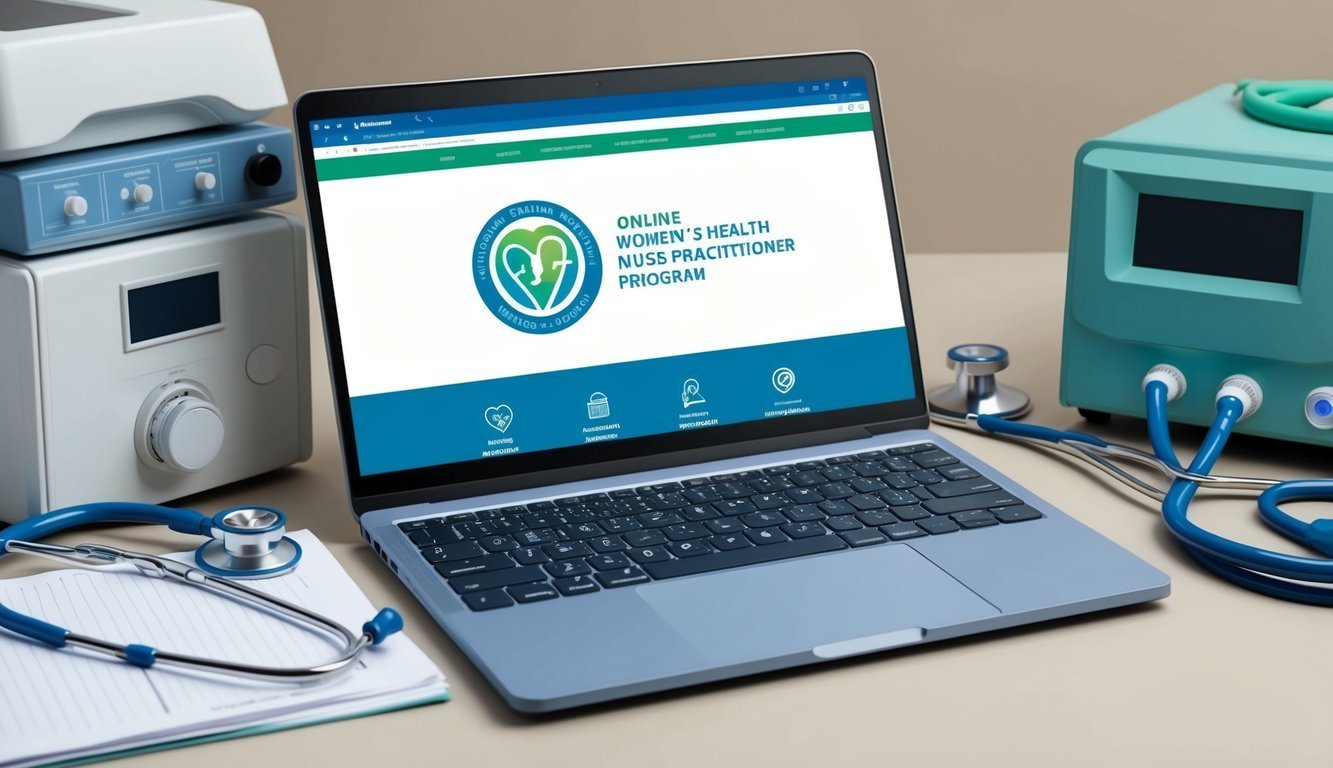Online women’s health nurse practitioner (NP) programs offer a flexible and accessible path to advanced nursing careers focused on women’s health. These programs combine rigorous academic coursework with clinical training to prepare you for a rewarding role in healthcare.
With the growing need for specialized care, these online options provide the chance to balance your education with personal and professional responsibilities.
Whether you’re looking to enhance your skills or start a new career, online women’s health NP programs cater to various needs and schedules.
You’ll explore essential topics in women’s health, including reproductive health, maternal care, and chronic disease management.
Many programs also emphasize hands-on experience through clinical placements, ensuring you gain practical skills while learning.
Finding the right program involves understanding admission requirements, curriculum specifics, and costs.
With a range of options available, you can choose a program that aligns with your career goals and financial situation.
Engaging in this educational journey can lead to a fulfilling career, making a significant impact in the lives of women.
Key Takeaways
- Online women’s health NP programs provide flexible learning opportunities.
- Many programs emphasize clinical training for real-world experience.
- Understanding costs and admission requirements is vital for success.
Overview of Online Women’s Health NP Programs
Online Women’s Health Nurse Practitioner (WHNP) programs are designed to prepare you for a specialized nursing career, focusing on women’s health.
These programs offer flexibility and accredited education, enabling you to balance your studies with personal and professional commitments.
Defining the Women’s Health Nurse Practitioner Role
As a Women’s Health Nurse Practitioner, you play a vital role in providing primary health care to women.
This includes preventive care, diagnosis, and treatment of various health concerns, from reproductive health to chronic conditions.
You will focus on the unique physiological and psychological needs of women throughout their lifespan.
WHNPs also advocate for women’s health issues and engage in community education, improving access to vital health resources for women in their communities.
Advantages of Online Learning and E-Learning Flexibility
Online learning provides significant advantages for those in the nursing field.
You can study at your own pace, making it easier to balance work, family, and education.
E-learning often allows for access to diverse resources such as virtual simulations, video lectures, and discussion forums.
This can enhance your understanding of complex subjects while enabling collaboration with peers and instructors from various locations.
Flexibility in scheduling also supports your ability to complete clinical hours at facilities near you, making it a practical option for busy professionals.
Accreditation and Educational Standards
Accreditation is critical in nursing education and ensures you receive quality training.
Many online WHNP programs are accredited by organizations such as the Commission on Collegiate Nursing Education (CCNE) or the Accreditation Commission for Education in Nursing (ACEN).
This accreditation guarantees that the program meets strict educational standards.
Attending an accredited program also makes you eligible for federal financial aid and ensures that your degree will be recognized by employers in the healthcare field.
Understanding the WHNP Curriculum
The WHNP curriculum typically combines theory and practical experience.
You can expect to study topics such as:
- Women’s health assessment
- Advanced pharmacology
- Family planning and reproductive health
- Management of chronic diseases
Most programs also include clinical practice components, allowing you to apply your knowledge in real-world settings.
You will usually need to complete an MSN degree with a focus on women’s health, which can take as few as 27 months in a full-time program.
Some institutions also offer pathways for doctoral study, further enhancing your qualifications in this specialized field.
Admission Requirements and Application Process
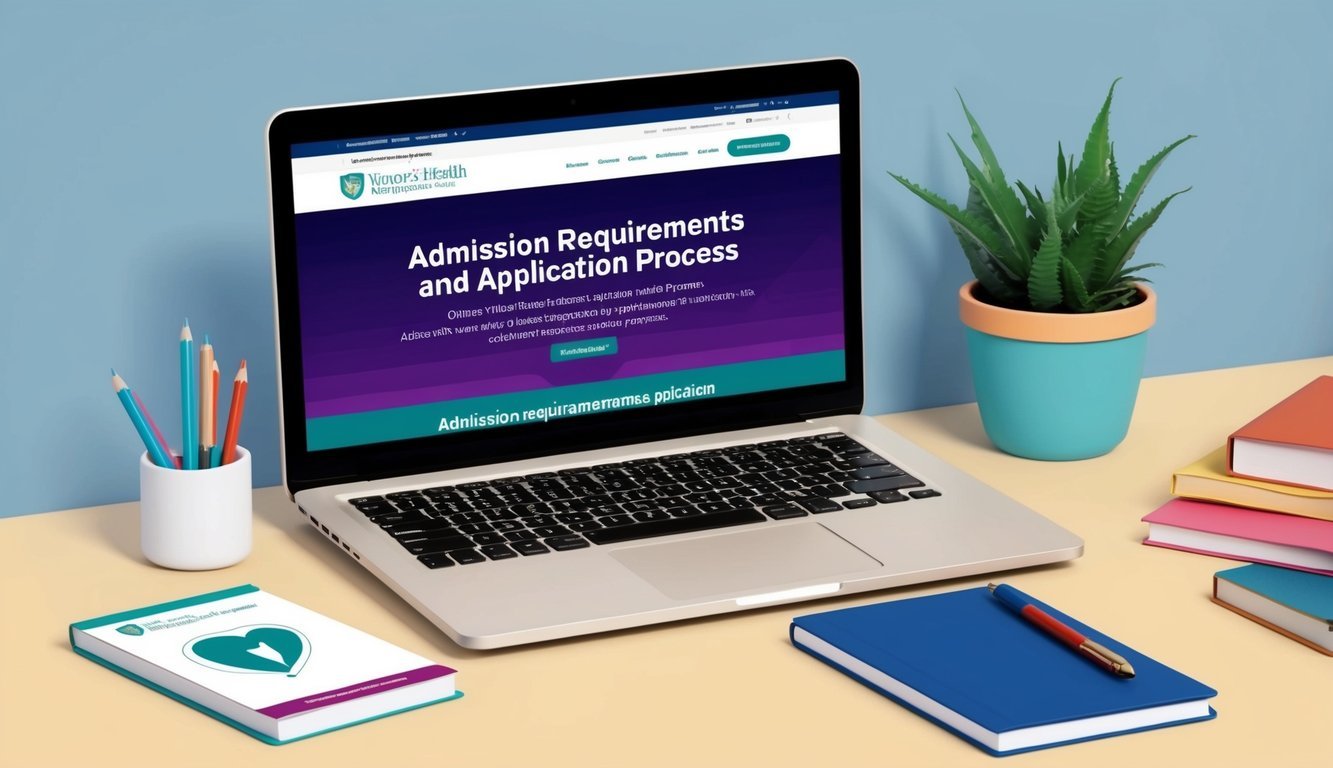
Understanding the admission requirements and application process is essential when planning to enroll in an online Women’s Health Nurse Practitioner program.
This section outlines the main components, including educational prerequisites, personal statements, nursing experience, and application deadlines.
Educational Prerequisites and BSN Degree
To apply for a Women’s Health Nurse Practitioner program, you must hold a Bachelor of Science in Nursing (BSN) degree.
This degree is vital because it demonstrates your foundational knowledge in nursing practice.
Most programs also require you to be a registered nurse (RN) with a valid nursing license.
Some may accept applicants who are in the process of obtaining their BSN, but verify this with your chosen school.
In general, the admissions criteria may include:
- Minimum GPA: Often, a GPA of at least 3.0 on a 4.0 scale.
- Transcripts: Official transcripts from all post-secondary institutions attended.
Check specific program requirements at institutions like NursingProcess.org for detailed guidelines.
Personal Statement and Nursing Experience
Your personal statement is a critical part of the application.
This is your chance to articulate your reasons for pursuing a career as a Women’s Health Nurse Practitioner.
Be sure to highlight your commitment to women’s health and any relevant experiences that shaped your interest.
Most programs also look for candidates with clinical nursing experience.
Having at least two years of bedside nursing experience is commonly expected.
This experience not only strengthens your application but also prepares you for advanced practice.
Additionally, be specific in your personal statement about achievements and challenges you’ve faced.
This helps committees assess your fit for the program.
Application Deadlines and Submission Guidelines
Each program has specific application deadlines, which are often set several months before the start of the academic term.
It is important to stay organized and aware of these dates.
Here are typical submission elements you may need:
- Completed Application Form: Usually found on the program’s website.
- Official Transcripts: Send these directly from your previous institutions.
- Letters of Recommendation: Typically, two to three letters from professionals who know your nursing background.
Make sure to submit all required documents before the deadline.
Some programs may also require an interview, so be prepared to discuss your nursing experience and career goals.
For more information on application guidelines, consult the University of Utah’s WHNP program.
Curriculum and Specialization in Women’s Health
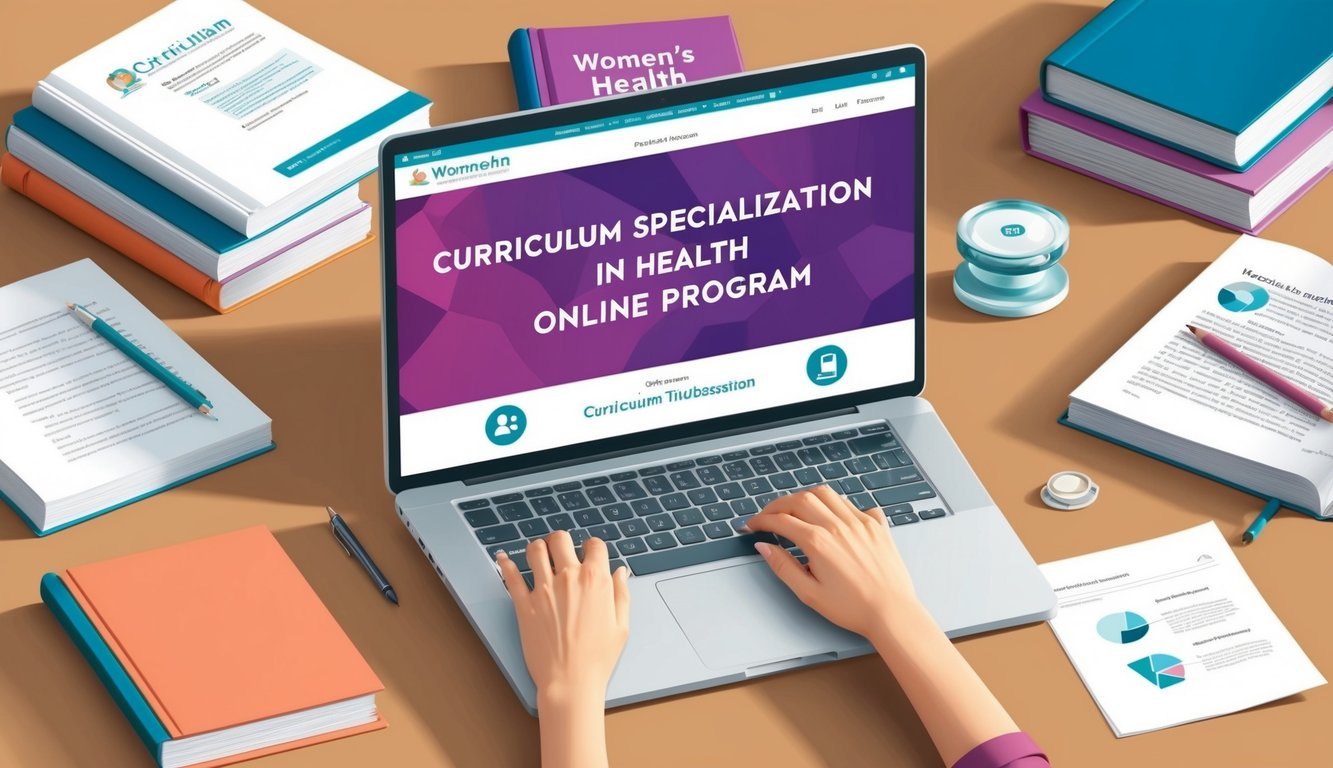
In online Women’s Health Nurse Practitioner (WHNP) programs, the curriculum is designed to provide you with the essential skills and knowledge necessary for specialized care.
The focus is on core competencies in nursing alongside specialized training in women’s health, gynecologic health, and reproductive health.
Core Nursing Competencies and Medical Knowledge
Your education will start with foundational nursing competencies essential for any healthcare provider.
This includes advanced pathophysiology, pharmacology, and health assessment.
Understanding these core principles allows you to effectively evaluate and manage patients’ health.
You will dive deep into medical knowledge relevant to women’s health.
This includes specific conditions, diseases, and treatments that impact female patients.
This knowledge equips you to make informed decisions and improve patient outcomes.
Specialized Care in Gynecologic and Reproductive Health
Specialization in gynecologic and reproductive health is a critical component of your training.
You will learn to manage conditions such as menstrual disorders, menopause, and reproductive health issues.
This prepares you to offer tailored treatments that address specific patient needs.
Courses often focus on practical aspects like diagnostic procedures and the latest therapeutic options.
This ensures you are ready to provide comprehensive care in areas such as family planning and prenatal care.
Incorporating Health Promotion and Disease Prevention
A significant emphasis of the WHNP curriculum is on health promotion and disease prevention.
You will explore strategies to encourage healthy behaviors among women, focusing on both physical and mental health.
Understanding the importance of preventive care is vital for addressing issues like breast and cervical cancer.
You will learn to educate patients about screenings and lifestyle changes that enhance well-being.
Clinical Hours and Experience Requirements
Clinical experience is crucial in WHNP programs.
You will engage in hands-on training through clinical rotations and supervised practices, totaling hundreds of hours.
This not only builds your confidence but also enhances your ability to work effectively in varied healthcare settings.
Programs typically require a set number of clinical hours dedicated to women’s health.
These experiences are invaluable for applying theoretical knowledge in real-world scenarios, improving your competence as a specialized nurse practitioner.
Clinical Training and Hands-On Experience
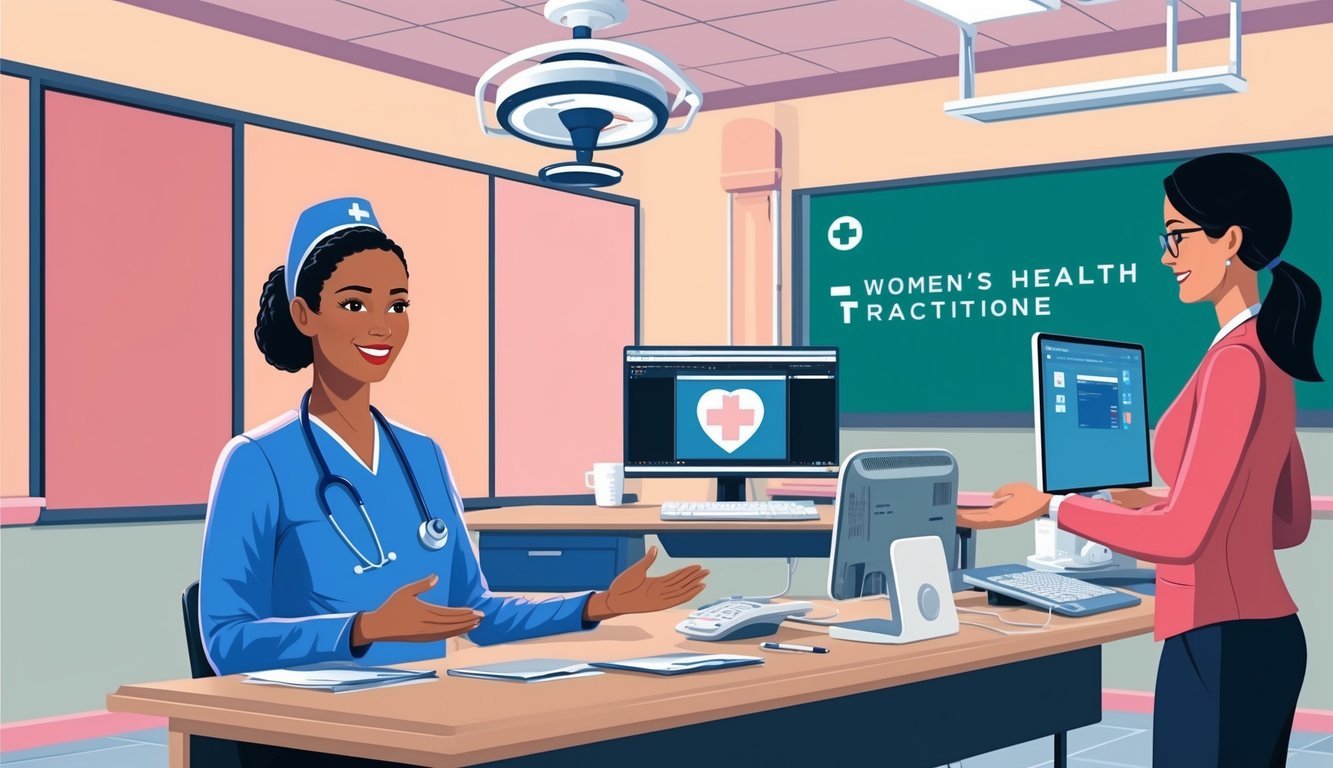
Clinical training is a key part of online Women’s Health Nurse Practitioner (WHNP) programs.
This training includes diverse clinical sites, the importance of intensives, and how to shift from classroom learning to real-world practice.
Each element plays an important role in preparing you for your nursing career.
Identifying Diverse Clinical Sites and Preceptors
Finding the right clinical sites and preceptors is crucial.
These sites should offer a wide range of experiences in women’s health.
You might work with obstetricians, gynecologists, or community health organizations.
Many programs help you connect with established clinical preceptors who have experience in women’s health.
Collaborating with these professionals allows you to gain insights into patient care, treatment options, and the healthcare system.
Diverse clinical placements prepare you for board certification and ensure you meet the clinical practice requirements.
Programs like Carlow University’s WHNP offer connections to varied sites to enhance your training.
The Role of Objective Clinical Intensives
Objective clinical intensives provide concentrated, hands-on training.
These experiences allow you to practice key skills in a supportive environment.
During these intensives, you may work in simulation labs or real clinical settings.
This enables you to gain confidence in delivering care, conducting assessments, and creating treatment plans.
Intensives focus on essential components of women’s health, ensuring you understand the complexities of care.
Programs emphasize the importance of learning under supervision, allowing you to ask questions and refine your skills.
Transitioning from Classroom to Advanced Practice
Moving from the classroom to clinical practice requires adjustment.
Your education should prepare you for the real-world challenges you will face as an advanced practice nurse.
Hands-on experiences throughout your program help you build a strong foundation.
You’ll apply classroom knowledge to real-life situations, addressing patient needs in various settings.
Networking with other healthcare professionals during your clinical placements exposes you to multi-disciplinary healthcare teams.
This prepares you for collaboration and enhances your ability to provide holistic care in your nursing career.
Costs, Financing, and Return on Investment
When considering online women’s health nurse practitioner programs, it’s essential to understand tuition costs, available financial aid, program outcomes, and long-term career prospects.
This information can help you make informed decisions about your education and future career.
Tuition Costs and Financial Aid Options
Tuition for women’s health nurse practitioner programs varies significantly among institutions.
For instance:
| University | Tuition per Credit Hour | Total Program Credits | Estimated Total Cost |
|---|---|---|---|
| Duke University | $1,984 | 45 | $89,280 |
| University of Missouri | $720.24 | 74 | ~$53,298 |
| Penn’s Women’s Health Program | $93,144 (Full-time) | – | $93,144 |
Many schools offer financial aid options, including scholarships, grants, and loan programs.
You should explore these opportunities to help manage costs.
Additionally, federal financial aid may also be available to you, depending on your enrollment status.
Examining Program Outcomes and Certification Rates
Program outcomes and certification rates are key indicators of success.
The National Certification Corporation offers the WHNP-BC certification, which is essential for practicing as a Women’s Health Nurse Practitioner.
It’s crucial to choose programs with high certification pass rates.
For example, a program with a 90% or higher pass rate indicates strong preparation.
This can reflect the quality of the education and the degree to which it meets the requirements for licensure as an advanced practice registered nurse (APRN).
You should review these rates on each program’s website or contact admissions for specifics.
Long-Term Career Prospects for Graduates
The career prospects for graduates from these programs are promising.
With your credentials as a women’s health nurse practitioner, you can expect various job opportunities.
Many graduates work as nurse-midwives, nurse educators, or in clinical settings.
According to current data, the demand for advanced practice registered nurses (APRNs) is rising.
Most states have favorable regulations for APRNs, which allows for greater independence in practice.
This growing demand often translates to competitive salaries.
You may find job openings in hospitals, clinics, and private practices, with many employers offering additional benefits such as continuing education support and flexible scheduling.
Frequently Asked Questions
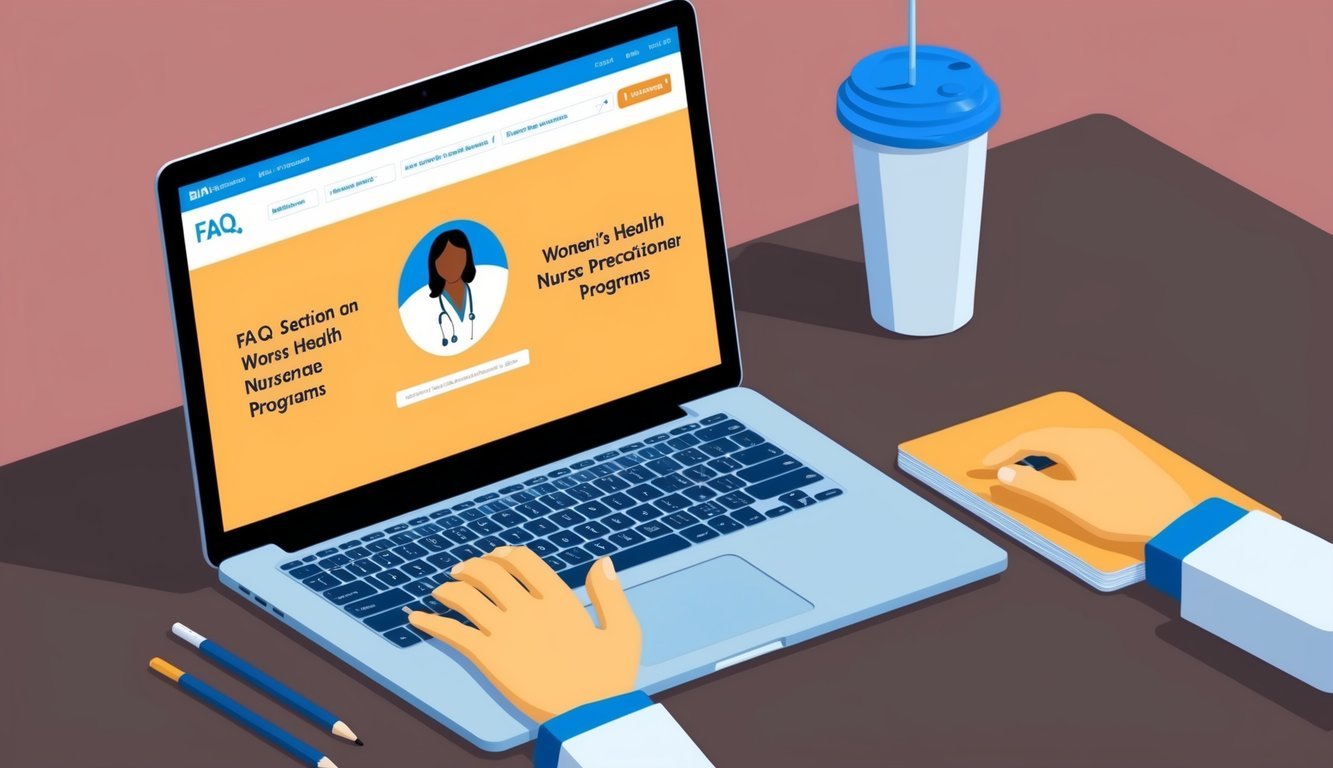
This section addresses common questions about online Women’s Health Nurse Practitioner (WHNP) programs.
You will find specific details regarding top programs, state approvals, prerequisites, salary expectations, and the role of WHNPs.
What are the top accredited online Women’s Health Nurse Practitioner programs?
Some of the leading accredited online WHNP programs include those offered by institutions such as Georgetown University and Emory University.
These programs provide the necessary education and training to excel in women’s health care.
How do I find an online Women’s Health NP program that is approved by my state?
To find an online WHNP program approved by your state, you can visit the nursing board website of your state.
They often list accredited programs.
Additionally, organizations like the American Association of Nurse Practitioners (AANP) can be helpful in finding approved programs.
What are the typical prerequisites for enrolling in an online Women’s Health NP program?
Prerequisites usually include a Bachelor of Science in Nursing (BSN) and a valid RN license.
Some programs may also require clinical experience or specific coursework.
Be sure to check the requirements for each program you consider to ensure you meet them.
What are the key differences between a Family Nurse Practitioner (FNP) and a Women’s Health Nurse Practitioner (WHNP)?
FNPs focus on overall family health, treating patients of all ages.
In contrast, WHNPs specialize in women’s health issues, including reproductive and sexual health.
Their training is tailored to address the unique needs of women throughout their lifespan.
What is the average salary for a Women’s Health Nurse Practitioner in the United States?
The average salary for a Women’s Health Nurse Practitioner in the United States is about $105,000 per year.
Depending on your location and experience, this number can vary.
States with higher demand may offer higher salaries.
What are the primary responsibilities of a Women’s Health Nurse Practitioner?
WHNPs provide comprehensive care to women.
This includes routine check-ups, prenatal care, and family planning education.
They also address specific health issues, such as menopause, contraceptive needs, and sexually transmitted infections.
Their role is crucial in promoting women’s health and well-being.

